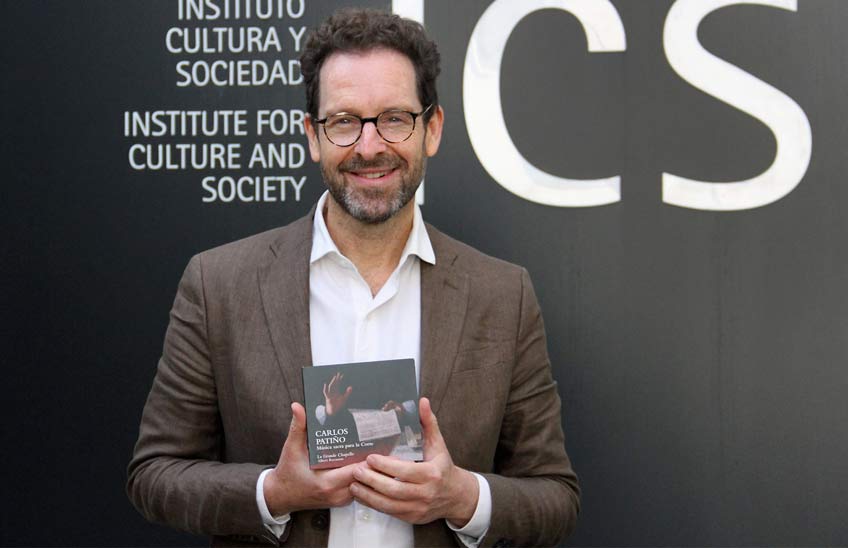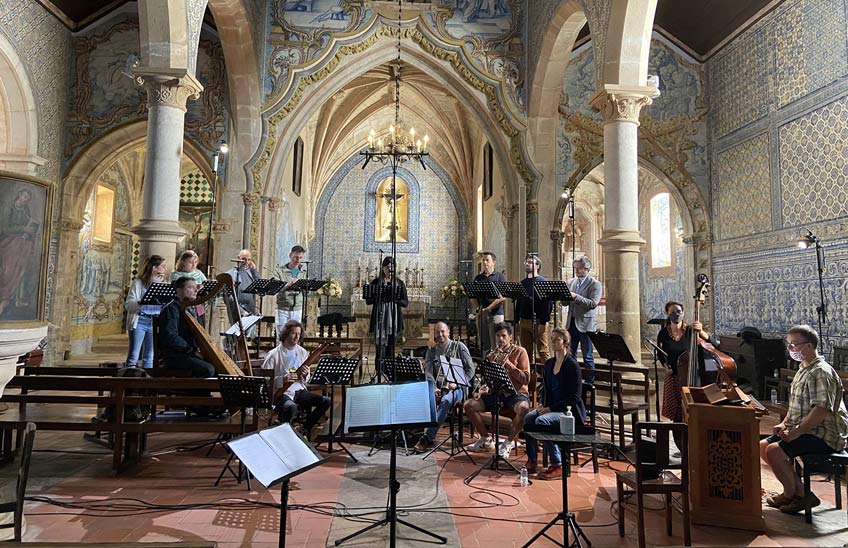Carlos Patiño, the musician whom Philip IV did not want to retire: the first recording of his emblematic works is released four centuries later.
Albert Recasens, researcher of the University and director of the ensemble La Grande Chapelle, presents the musicological recovery of the most outstanding vocal works in Latin by this Spanish Baroque genius.

FotoNatalia Rouzaut/<br>Albert Recasens es investigador del grupo 'Creatividad y herencia cultural' del Instituto Cultura y Sociedad (ICS) y director del conjunto musical La Grande Chapelle.
26 | 05 | 2021
Carlos Patiño (1600-1675) was chapel master to Philip IV for 30 years and the monarch appreciated his music so much that he never allowed him to retire. Four centuries later, the world's first recording of the most emblematic Latin vocal works of this Baroque genius is presented. position The recovery has been carried out by director and musicologist Albert Recasens, who has researched the works in the Institute for Culture and Society (ICS) of the University of Navarra and has recorded them with his ensemble La Grande Chapelle.
To carry out this work, he has consulted the archives of numerous archives in which bequest by the master from Cuenca is preserved, such as those of the monasteries of Montserrat and El Escorial, which holds the main collection of his works in Latin; those of the cathedrals of Ávila, Burgos, Cuenca, Valencia, Las Palmas, Valladolid, Segovia, Salamanca and Santiago de Compostela; and the Library Services Nacional de Catalunya, among others. It has also accessed documents preserved in the New Continent: Guatemala City and Puebla.
Patiño trained at Seville cathedral, where he entered contact with the Duke of Braganza and the future King John IV of Portugal, with whom he corresponded. After the death of his wife, he wanted to move away from the Andalusian capital and went to Salamanca. place He then left for Madrid and was made maestro de capilla at the Royal Monastery of La Encarnación, where he was appointed to the post of maestro de capilla. During these years he consolidated his prestige at court and in 1634 he became maestro de capilla to Philip IV. He was the first non-French-Flemish artist to achieve this post at the Spanish Habsburg court.
"During those three decades in the service of the king, he became a point of reference for Spanish and Latin American cathedrals", said Recasens, who considers that "he is one of the great masters of the Baroque and an innovator in his native country, as he integrated elements of European modernity". His influence was a determining factor for the following generations of Hispanic musicians.
Reconstructing the soundscape in Velázquez's time
From Patiño's extensive corpus board member , Recasens has selected for the disc some of his most emblematic religious compositions in Latin, written for the great court ceremonies. Among the jewels recovered is a previously unpublished version preserved in Segovia of the motet Maria Mater Dei, one of Patiño's favourite compositions. "We know this because he had himself portrayed with it in the painting of him at the Library Services Nacional. It is the only pictorial work that has come down to us of a Spanish musician from the 17th century", said Recasens.
The expert stressed that research and the disc "contribute to reconstructing the soundscape of the times of the geniuses of the 17th century, such as Velázquez and Calderón de la Barca". One of his objectives is precisely to "fill in the gaps" about the great composers of the period: "The Hispanic Golden Age is internationally renowned for its literature, plastic arts, sculpture, architecture... We must also recover the musical repertoire, which forms part of the heritage of the whole of Europe and humanity".
Carlos Patiño: Música sacra para la corte is part of the CSIC's early music collection "Musica Poetica". It has been published with the support of sponsorship of the committee Superior de Investigaciones Científicas (CSIC) and the Consejería de Cultura y Turismo de la Comunidad de Madrid. It should be noted that it was recorded in September 2020 in the church of St. Quintin in Sobral de Monte Agraço, Portugal, with numerous logistical difficulties due to the pandemic.
The recovery work and the album will be presented on 1 June in a virtual event with the participation of Albert Recasens; Pablo L. Rodríguez, professor at the University of La Rioja and critic of El País; Guillaume Kientz, Director of the Hispanic Society (New York, USA); Antonio Álvarez-Ossorio Alvariño, professor at the Universidad Autónoma de Madrid (UAM) and director of the Madrid Institute for Advanced Study (MIAS); and Julia Pavón, principal investigator of group 'Creativity and Cultural Heritage' of the ICS.

The album was recorded in September 2020 in the Church of St. Quintin in Sobral de Monte Agraço, Portugal, with many logistical difficulties due to the pandemic.
workshop virtual de presentation from the album Carlos Patiño: música sacra para la corte
Date: Tuesday, 1 June 2021
Time: 18:00
The activity is open and free of charge.
